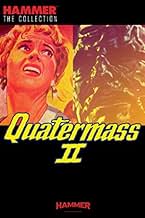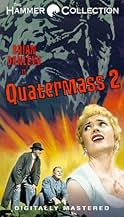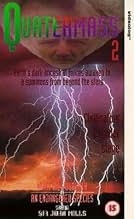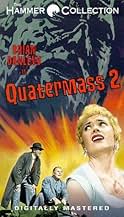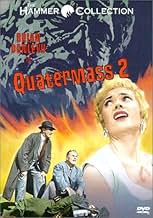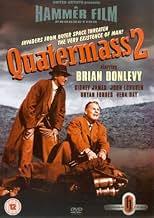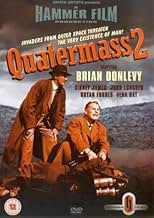VALUTAZIONE IMDb
6,7/10
5100
LA TUA VALUTAZIONE
Aggiungi una trama nella tua linguaProfessor Quatermass, trying to gather support for his Lunar colonisation project, is intrigued by mysterious traces that have been showing up.Professor Quatermass, trying to gather support for his Lunar colonisation project, is intrigued by mysterious traces that have been showing up.Professor Quatermass, trying to gather support for his Lunar colonisation project, is intrigued by mysterious traces that have been showing up.
John Longden
- Lomax
- (as John Longdon)
Sidney James
- Jimmy Hall
- (as Sydney James)
Recensioni in evidenza
'Quatermass 2' is even better than the excellent 'The Quatermass Xperiment'. Like the first movie it was a remake of the original British TV production which I have sadly not seen (both are lost I think). Val Guest directs once again, Brian Donlevy reprises the role of the crusty Professor Quatermass, and this time Nigel Kneale was allowed to adapt his own original script, which probably explains why it improves on the first movie. Quatermass stumbles across a mysterious secret Government installation which is supposedly developing synthetic food, but is in fact something quite different and frightening. Donlevy isn't my favourite Quatermass but he is better here than in the first movie, and the supporting cast includes John Longden in the role originally played by Jack Warner, Bryan Forbes as Quatermass' assistant Marsh (another change of actor), comedian Sid James of 'Carry On' fame, and Hammer regular Michael Ripper. 'Quatermass 2' is a very entertaining and suspenseful thriller, which hasn't dated as half as much as you'd expect. It will particularly be interesting to fans of 'Invasion Of The Body Snatchers', which it shares certain themes with, and 'The X-Files', which many people, myself included, would argue owes this movie and the next in the series 'Quatermass and the Pit' a large debt. Nigel Kneale is one of the most underrated writers of SF and horror of our time (over 80 years old and still active!), and the Quatermass movies are his best known and enjoyable achievements. I highly recommend them all.
This film was actually the first sequel to use a number in the title (although it's American title was "Enemy from Space"). Not only was this a cleverly written film, based on Nigel Kneale's screenplay, but it was a cruel satire on English and American culture in the 1950s.
In a nutshell, Professor Bernard Quatermass, leader of England's rocket group, is at wit's end trying to get more funding for his projected moon project. The British government decides it has "projects of far greater importance.'' At the same time, workers at Quatermass' base detect scores of what look like meteorites falling close by. When Quatermass investigates, he not only finds remnants of the meteorites, but his moon base, conveniently appropriated by an unknown government entity. His lab assistant picks up one of the meteorites and it explodes in his face, immediately infecting him with an alien parasite.
Quatermass is forced to go it almost alone, helped by a cynical police inspector, a drunken beat reporter and a vigilant member of parliament who can't get even his own party members to question where millions of pounds of tax dollars are going to.
The cruel satire comes from the comparison of Western governments of the 1950s to the communist governments they vehemently opposed during the Cold War years. British citizens were taught to implicitly trust government even as it spent millions to unknowingly fund an alien invasion. Civilian workers were so glad to have jobs they don't question why the supposed "synthetic food" plant they're building needs huge doses of toxic gases like ammonia. Even when evidence of wrongdoing is brought up, government red tape squelches it.
As for the movie itself, it is much better written than the original ("The Quatermass Experiment"). Nigel Kneale softens Quatermass' dour and brusk personality. Director Val Guest effectively uses a string musical score to build a creepy atmosphere. He and Kneale even overcome the first movie's dull ending, which had an alien getting electrocuted with no suspense whatsoever. Here, the plant workers, angry that one of their own is carted away by infected security guards at gunpoint, try to storm the plant, turning the aliens' carefully planned invasion on its ear. The irony, of course, is that the plant was conceived because government bureaucracy kept it secret. Now, as the plant is threatened, the same secrecy prevents the aliens from calling for help from the police or armed forces.
The special effects are better in this film, though the giant aliens at the end are not as convincing as they could be. Still, the film is a great example of British science fiction, which relied more on plot and characterization than the special effects that dominated American science fiction.
In a nutshell, Professor Bernard Quatermass, leader of England's rocket group, is at wit's end trying to get more funding for his projected moon project. The British government decides it has "projects of far greater importance.'' At the same time, workers at Quatermass' base detect scores of what look like meteorites falling close by. When Quatermass investigates, he not only finds remnants of the meteorites, but his moon base, conveniently appropriated by an unknown government entity. His lab assistant picks up one of the meteorites and it explodes in his face, immediately infecting him with an alien parasite.
Quatermass is forced to go it almost alone, helped by a cynical police inspector, a drunken beat reporter and a vigilant member of parliament who can't get even his own party members to question where millions of pounds of tax dollars are going to.
The cruel satire comes from the comparison of Western governments of the 1950s to the communist governments they vehemently opposed during the Cold War years. British citizens were taught to implicitly trust government even as it spent millions to unknowingly fund an alien invasion. Civilian workers were so glad to have jobs they don't question why the supposed "synthetic food" plant they're building needs huge doses of toxic gases like ammonia. Even when evidence of wrongdoing is brought up, government red tape squelches it.
As for the movie itself, it is much better written than the original ("The Quatermass Experiment"). Nigel Kneale softens Quatermass' dour and brusk personality. Director Val Guest effectively uses a string musical score to build a creepy atmosphere. He and Kneale even overcome the first movie's dull ending, which had an alien getting electrocuted with no suspense whatsoever. Here, the plant workers, angry that one of their own is carted away by infected security guards at gunpoint, try to storm the plant, turning the aliens' carefully planned invasion on its ear. The irony, of course, is that the plant was conceived because government bureaucracy kept it secret. Now, as the plant is threatened, the same secrecy prevents the aliens from calling for help from the police or armed forces.
The special effects are better in this film, though the giant aliens at the end are not as convincing as they could be. Still, the film is a great example of British science fiction, which relied more on plot and characterization than the special effects that dominated American science fiction.
The Quatermass Xperiment had been a major success for Hammer upon its release in 1955, becoming the company's biggest grossing film up to that time. Moving quickly to capitalise, Hammer Film Productions put together the elements for the sequel, Quatermass 2 (AKA Enemy From Space). Val Guest once again directs and co writes with Quatermass creator Nigel Kneale, Brian Donlevy returns as the irrepressible professor Quatermass, James Bernard scores and Anthony Hinds is again on production duties. Joining Donlevy in the cast are John Longden, Sid James, Bryan Forbes, William Franklyn & Vera Day. The plot sees Quatermass investigating meteorites that have been falling at Winnerden Flats. Whilst up in the Winnerden Valley, Quatermass and his colleague, Marsh, discover a huge power plant complex that looks suspiciously like the model Quatermass has been working on as part of a potential colonisation of the Moon. When Marsh is burnt by one of the meteorites, guards appear from nowhere and take him away down in the valley. Just what is going on at this strange plant? Quartermass intends to find out, but Winnerden has many secrets, secrets that could spell doom for mankind.
A sequel that is at least the equal of its predecessor, Quatermass 2 deals in politico paranoia and chilly alien invasion hysteria. Similar to Don Siegel's excellent Invasion Of The Body Snatchers from the previous year, the film doesn't rely on shlonky shocks to make its heart beat. There's much sci-fi discussion and jobs-worth like characters that are easy to follow, but all serve a purpose as Winnerden's secret starts to show its cards. As Quatermass' trail leads to the higher echelons of power, the paranoiac feel of the piece really kicks in, with the mood greatly enhanced by Gerald Gibbs' monochrome photography and Guest's imaginative use of hand held cameras for certain scenes. The effects work is clever and does its job, while the cast work hard to make the effective story work. Tho the film made good money it was overshadowed by the huge success of Hammer's release of The Curse Of Frankenstein the same year, while the film wasn't given much promotional help from Kneale who was very critical of the finished product. With much of his scorn directed towards Donlevy who he always felt was wrong for the role of the intrepid boffin. With that in mind, it's perhaps unsurprising to find the film still today is very divisive among critics and sci-fi fans alike. So you take your chance then. Personally I think it's one of the best sci-fi movies to have come out of Britian. As was the first film, and as was Quatermass And The Pit from 1967. Pretty great trilogy actually. 8/10
A sequel that is at least the equal of its predecessor, Quatermass 2 deals in politico paranoia and chilly alien invasion hysteria. Similar to Don Siegel's excellent Invasion Of The Body Snatchers from the previous year, the film doesn't rely on shlonky shocks to make its heart beat. There's much sci-fi discussion and jobs-worth like characters that are easy to follow, but all serve a purpose as Winnerden's secret starts to show its cards. As Quatermass' trail leads to the higher echelons of power, the paranoiac feel of the piece really kicks in, with the mood greatly enhanced by Gerald Gibbs' monochrome photography and Guest's imaginative use of hand held cameras for certain scenes. The effects work is clever and does its job, while the cast work hard to make the effective story work. Tho the film made good money it was overshadowed by the huge success of Hammer's release of The Curse Of Frankenstein the same year, while the film wasn't given much promotional help from Kneale who was very critical of the finished product. With much of his scorn directed towards Donlevy who he always felt was wrong for the role of the intrepid boffin. With that in mind, it's perhaps unsurprising to find the film still today is very divisive among critics and sci-fi fans alike. So you take your chance then. Personally I think it's one of the best sci-fi movies to have come out of Britian. As was the first film, and as was Quatermass And The Pit from 1967. Pretty great trilogy actually. 8/10
Val Guest's Quatermass II is my favourite film ever. The cold, dawning revelation that builds up all the way through the first half of the film that the invasion is actually underway and that the 'zombies' not only WALK AMONG US, but are actually IN CHARGE and IN POWER is terrifyingly atmospheric. I always like to think that if the invasion ever did come, it wouldn't come through massive mother ships as per Independence Day, but from within, from the suburbs, the rural villages. Really clever invaders would use Earth's own power structures, governments and resources against it without anyone noticing, not turn up en masse in flying saucers spoiling for a fight. The idea of the invasion falling to Earth in meteorites through a form of collective intelligence (recycled in the 1973 BBC Doctor Who serial Spearhead From Space) continues this threatening vein of invasion, and provides the most atmospheric scene in the film when Quatermass stands in the open night air as whizzing sounds around him give away the increased number of the meteorites now falling (the invasion is now fully underway!). Other scenes are just downright terrifying and follow the Kneale tradition of 'terror through revelation': the lorries in London carrying the symbol; Quatermass' first glimpse through the dome viewing panel; and when it is revealed how the zombies are blocking the pipes!! This 'revelation' aspect can be seen in all of the Quatermass films and serials (in The Quatermass Conclusion: when it is revealed by the body parts that the hippies weren't 'transported', in Quatermass and the Pit: 'you mean WE are the Martians!!'). Storytelling, atmosphere and terror like this hasn't survived the onset of today's special effects. Film makers like Dean Devlin just don't need to employ methods like this anymore, and this is why thinking people's science fiction relying on chilling, atmospheric and scientifically valid stories, plots and concepts will never ever be repeated.
This movie sees Brian Donleavy reprise the role of Bernard Quatermass,who when the movie opens is not a happy man,the British government having turned down his plans for a Moon colony.Distraction arrives in the form of objects from outer space landing in northern England .On going to investigate he finds a site looking more than a little like the moon project mock up,and to complicate matters his assistant(played by future author/director Bryan Forbes,then in his stalwart character actor mode)is stricken by on coming into contact with the alien substance and is carted away by the guards on the project
Quatermass gains entry to the plant as part of a parliamentary study group who are assured it is a project to manufacture synthetic food.Naturally ,they are being economical with the truth and the plant is the front for an alien invasion
How the intrepid if permanently bad tempered scientist tackles the problem is the root of the movie which still has resonance today in its suggestion of cover up and conspiracy,aliens having infiltrated the government and police(This would explain why British politicians seem determined that we shall be ruled by aliens--the EC!)
The movie makes good use of locations and the alien plant is an old utilities generation plant that looks chilling and strangely futuristic.Donleavy is too much on one note as,but Sid James is effective in a rare straight role as a hard drinking journalist and the rest of the cast are adequate
Special effects are antiquated.What still works are its atmosphere and sense of paranoia regarding our political lords and masters.
Quatermass gains entry to the plant as part of a parliamentary study group who are assured it is a project to manufacture synthetic food.Naturally ,they are being economical with the truth and the plant is the front for an alien invasion
How the intrepid if permanently bad tempered scientist tackles the problem is the root of the movie which still has resonance today in its suggestion of cover up and conspiracy,aliens having infiltrated the government and police(This would explain why British politicians seem determined that we shall be ruled by aliens--the EC!)
The movie makes good use of locations and the alien plant is an old utilities generation plant that looks chilling and strangely futuristic.Donleavy is too much on one note as,but Sid James is effective in a rare straight role as a hard drinking journalist and the rest of the cast are adequate
Special effects are antiquated.What still works are its atmosphere and sense of paranoia regarding our political lords and masters.
Lo sapevi?
- QuizThis is believed to be the first film ever to use the arabic numeral 2 as an indicator that it was the sequel to another film (as opposed to Roman numerals).
- BlooperWhen hurrying to the phone in the Pressure Control Block, McLeod puts down his jacket, which slips to the floor. It appears to have returned to where he originally placed it when he retrieves it in another shot, however.
- Citazioni
Quatermass: They tell me you have no police here?
Dawson: Police? We don't need them - we're a law-abiding community, aren't we?
- ConnessioniFeatured in The Saturday Afternoon Movie: Enemy From Space (1966)
I più visti
Accedi per valutare e creare un elenco di titoli salvati per ottenere consigli personalizzati
- How long is Quatermass 2?Powered by Alexa
Dettagli
- Data di uscita
- Paese di origine
- Lingua
- Celebre anche come
- Quatermass e i vampiri dello spazio
- Luoghi delle riprese
- Azienda produttrice
- Vedi altri crediti dell’azienda su IMDbPro
Botteghino
- Budget
- 92.000 £ (previsto)
- Lordo in tutto il mondo
- 77 USD
- Tempo di esecuzione1 ora 25 minuti
- Colore
Contribuisci a questa pagina
Suggerisci una modifica o aggiungi i contenuti mancanti

Divario superiore
By what name was I vampiri dello spazio (1957) officially released in India in English?
Rispondi

